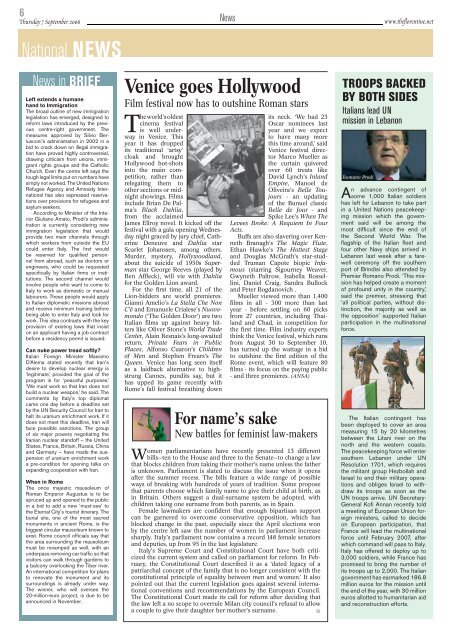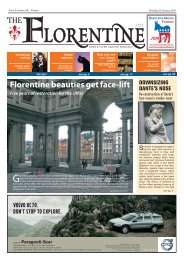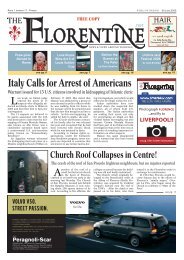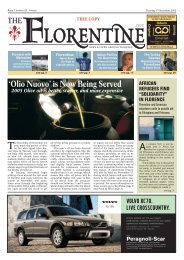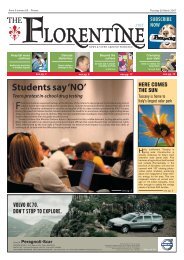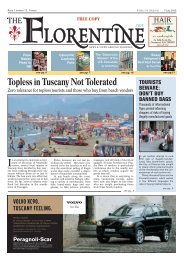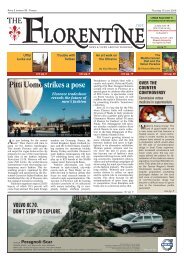Italy's favourite son, finally moving out - The Florentine
Italy's favourite son, finally moving out - The Florentine
Italy's favourite son, finally moving out - The Florentine
Create successful ePaper yourself
Turn your PDF publications into a flip-book with our unique Google optimized e-Paper software.
6<br />
Thursday 7 September 2006 News<br />
www.theflorentine.net<br />
National NEWS<br />
News in BRIEF<br />
Left extends a humane<br />
hand to Immigration<br />
<strong>The</strong> broad <strong>out</strong>line of new immigration<br />
legislation has emerged, designed to<br />
reform laws introduced by the previous<br />
centre-right government. <strong>The</strong><br />
measures approved by Silvio Berlusconi’s<br />
administration in 2002 in a<br />
bid to crack down on illegal immigration<br />
have proved highly controversial,<br />
drawing criticism from unions, immigrant<br />
rights groups and the Catholic<br />
Church. Even the centre left says the<br />
tough legal limits put on numbers have<br />
simply not worked. <strong>The</strong> United Nations<br />
Refugee Agency and Amnesty International<br />
has also expressed reservations<br />
over provisions for refugees and<br />
asylum-seekers.<br />
According to Minister of the Interior<br />
Giuliano Amato, Prodi’s administration<br />
is currently considering new<br />
immigration legislation that would<br />
provide two main channels through<br />
which workers from <strong>out</strong>side the EU<br />
could enter Italy. <strong>The</strong> fi rst would<br />
be reserved for qualifi ed per<strong>son</strong>nel<br />
from abroad, such as doctors or<br />
engineers, who could be requested<br />
specifi cally by Italian fi rms or institutions.<br />
<strong>The</strong> second channel would<br />
involve people who want to come to<br />
Italy to work as domestic or manual<br />
labourers. <strong>The</strong>se people would apply<br />
to Italian diplomatic missions abroad<br />
and receive minimum training before<br />
being able to enter Italy and look for<br />
work. This idea contrasts with the key<br />
provision of existing laws that insist<br />
on an applicant having a job contract<br />
before a residency permit is issued.<br />
Can nuke power tread softly?<br />
Italian Foreign Minister Massimo<br />
D’Alema stated recently that Iran’s<br />
desire to develop nuclear energy is<br />
‘legitimate,’ provided the goal of the<br />
program is for ‘peaceful purposes.’<br />
‘We must work so that Iran does not<br />
build a nuclear weapon,’ he said. <strong>The</strong><br />
comments by Italy’s top diplomat<br />
came one day before a deadline set<br />
by the UN Security Council for Iran to<br />
halt its uranium enrichment work. If it<br />
does not meet this deadline, Iran will<br />
face possible sanctions. <strong>The</strong> group<br />
of six major powers negotiating the<br />
Iranian nuclear standoff – the United<br />
States, France, Britain, Russia, China<br />
and Germany – have made the suspension<br />
of uranium enrichment work<br />
a pre-condition for opening talks on<br />
expanding cooperation with Iran.<br />
When in Rome<br />
<strong>The</strong> once majestic mausoleum of<br />
Roman Emperor Augustus is to be<br />
spruced up and opened to the public<br />
in a bid to add a new ‘must-see’ to<br />
the Eternal City’s tourist itinerary. <strong>The</strong><br />
burial site, one of the most sacred<br />
monuments in ancient Rome, is the<br />
biggest circular mausoleum known to<br />
exist. Rome council offi cials say that<br />
the area surrounding the mausoleum<br />
must be revamped as well, with an<br />
underpass re<strong>moving</strong> car traffi c so that<br />
visitors can walk through gardens to<br />
a balcony overlooking the Tiber river.<br />
An international competition for plans<br />
to renovate the monument and its<br />
surroundings is already under way.<br />
<strong>The</strong> winner, who will oversee the<br />
20-million-euro project, is due to be<br />
announced in November.<br />
Venice goes Hollywood<br />
Film festival now has to <strong>out</strong>shine Roman stars<br />
<strong>The</strong> world’s oldest<br />
cinema festival<br />
is well underway<br />
in Venice. This<br />
year it has dropped<br />
its traditional ‘artsy’<br />
cloak and brought<br />
Hollywood hot-shots<br />
into the main competition,<br />
rather than<br />
relegating them to<br />
other sections or midnight<br />
showings. Films<br />
include Brian De Palma’s<br />
Black Dahlia,<br />
from the acclaimed<br />
James Ellroy novel. It kicked off the<br />
festival with a gala opening Wednesday<br />
night graced by jury chief, Catherine<br />
Deneuve and Dahlia star<br />
Scarlet Johanssen, among others.<br />
Murder, mystery, Hollywoodland,<br />
ab<strong>out</strong> the suicide of 1950s Superman<br />
star George Reeves (played by<br />
Ben Affleck), will vie with Dahlia<br />
for the Golden Lion award.<br />
For the first time, all 21 of the<br />
Lion-bidders are world premieres.<br />
Gianni Amelio’s La Stella Che Non<br />
C’è and Emanuele Crialese’s Nuovomondo<br />
(‘<strong>The</strong> Golden Door’) are two<br />
Italian films up against heavy hitters<br />
like Oliver Stone’s World Trade<br />
Center, Alain Resnais’s long-awaited<br />
return, Private Fears in Public<br />
Places, Alfonso Cuaron’s Children<br />
of Men and Stephen Frears’s <strong>The</strong><br />
Queen. Venice has long seen itself<br />
as a laidback alternative to highstrung<br />
Cannes, pundits say, but it<br />
has upped its game recently with<br />
Rome’s fall festival breathing down<br />
its neck. ‘We had 23<br />
Oscar nominees last<br />
year and we expect<br />
to have many more<br />
this time around,’ said<br />
Venice festival director<br />
Marco Mueller as<br />
the curtain quivered<br />
over 60 treats like<br />
David Lynch’s Inland<br />
Empire, Manoel de<br />
Oliveira’s Belle Toujours<br />
- an updating<br />
of the Bunuel classic<br />
Belle de Jour - and<br />
Spike Lee’s When <strong>The</strong><br />
Levees Broke: A Requiem In Four<br />
Acts.<br />
Buffs are also slavering over Kenneth<br />
Branagh’s <strong>The</strong> Magic Flute,<br />
Ethan Hawke’s <strong>The</strong> Hottest Stage<br />
and Douglas McGrath’s star-studded<br />
Truman Capote biopic Infamous<br />
(starring Sigourney Weaver,<br />
Gwyneth Paltrow, Isabella Rossellini,<br />
Daniel Craig, Sandra Bullock<br />
and Peter Bogdanovich .<br />
Mueller viewed more than 1,400<br />
films in all - 300 more than last<br />
year - before settling on 60 picks<br />
from 27 countries, including Thailand<br />
and Chad, in competition for<br />
the first time. Film industry experts<br />
think the Venice festival, which runs<br />
from August 30 to September 10,<br />
has turned up the wattage in a bid<br />
to <strong>out</strong>shine the first edition of the<br />
Rome event, which will feature 80<br />
films - its focus on the paying public<br />
- and three premieres. (ANSA)<br />
For name’s sake<br />
New battles for feminist law-makers<br />
Women parliamentarians have recently presented 13 different<br />
bills—ten to the House and three to the Senate—to change a law<br />
that blocks children from taking their mother’s name unless the father<br />
is unknown. Parliament is slated to discuss the issue when it opens<br />
after the summer recess. <strong>The</strong> bills feature a wide range of possible<br />
ways of breaking with hundreds of years of tradition. Some propose<br />
that parents choose which family name to give their child at birth, as<br />
in Britain. Others suggest a dual-surname system be adopted, with<br />
children taking one surname from both parents, as in Spain.<br />
Female lawmakers are confident that enough bipartisan support<br />
can be garnered to overcome conservative opposition, which has<br />
blocked change in the past, especially since the April elections won<br />
by the centre left saw the number of women in parliament increase<br />
sharply. Italy’s parliament now contains a record 148 female senators<br />
and deputies, up from 95 in the last legislature.<br />
Italy’s Supreme Court and Constitutional Court have both criticized<br />
the current system and called on parliament for reform. In February,<br />
the Constitutional Court described it as a ‘dated legacy of a<br />
patriarchal concept of the family that is no longer consistent with the<br />
constitutional principle of equality between men and women.’ It also<br />
pointed <strong>out</strong> that the current legislation goes against several international<br />
conventions and recommendations by the European Council.<br />
<strong>The</strong> Constitutional Court made its call for reform after deciding that<br />
the law left a no scope to overrule Milan city council’s refusal to allow<br />
a couple to give their daughter her mother’s surname.<br />
TROOPS BACKED<br />
BY BOTH SIDES<br />
Italians lead UN<br />
mission in Lebanon<br />
Romano Prodi<br />
An advance contingent of<br />
some 1,000 Italian soldiers<br />
has left for Lebanon to take part<br />
in a United Nations peacekeeping<br />
mission which the government<br />
said will be among the<br />
most diffi cult since the end of<br />
the Second World War. <strong>The</strong><br />
fl agship of the Italian fl eet and<br />
four other Navy ships arrived in<br />
Lebanon last week after a farewell<br />
ceremony off the s<strong>out</strong>hern<br />
port of Brindisi also attended by<br />
Premier Romano Prodi. ‘This mission<br />
has helped create a moment<br />
of profound unity in the country,’<br />
said the premier, stressing that<br />
‘all political parties, with<strong>out</strong> distinction,<br />
the majority as well as<br />
the opposition’ supported Italian<br />
participation in the multinational<br />
force.<br />
<strong>The</strong> Italian contingent has<br />
been deployed to cover an area<br />
measuring 15 by 20 kilometres<br />
between the Litani river on the<br />
north and the western coasts.<br />
<strong>The</strong> peacekeeping force will enter<br />
s<strong>out</strong>hern Lebanon under UN<br />
Resolution 1701, which requires<br />
the militant group Hezbollah and<br />
Israel to end their military operations<br />
and obliges Israel to withdraw<br />
its troops as soon as the<br />
UN troops arrive. UN Secretary-<br />
General Kofi Annan recently told<br />
a meeting of European Union foreign<br />
ministers, called to decide<br />
on European participation, that<br />
France will lead the multinational<br />
force until February 2007, after<br />
which command will pass to Italy.<br />
Italy has offered to deploy up to<br />
3,000 soldiers, while France has<br />
promised to bring the number of<br />
its troops up to 2,000. <strong>The</strong> Italian<br />
government has earmarked 186.8<br />
million euros for the mission until<br />
the end of the year, with 30 million<br />
euros allotted to humanitarian aid<br />
and reconstruction efforts.


